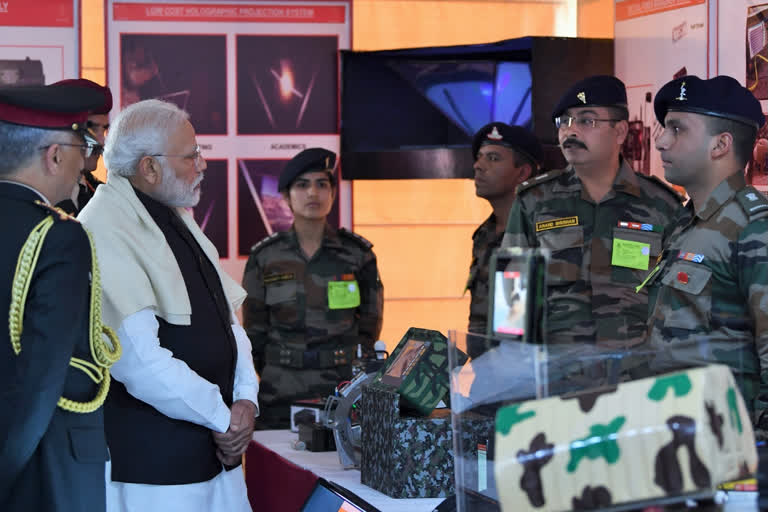New Delhi: The Chief of the Army Staff, General MM Naravane, in a press conference on the eve of Army Day, said, "We swear allegiance to the Constitution of India. Be it officers or jawans, we have taken an oath to protect the Constitution, and that is what should guide us in all time and all our actions. What it translates into is also the core values which are enshrined in the Preamble to the Constitution, which are justice, liberty, equality, and fraternity. That is what we are fighting for".
The Army Chief was emphasizing that every soldier of the Indian Army swears an oath that he will “bear true faith and allegiance to the Constitution of India”. While this fact is commonly known, the real importance of the Army’s Chief’s statement lies in the fact that it comes in the backdrop of some voices that have been claiming that the military is being increasingly politicised. Recently, General Bipin Rawat's comments on the anti-CAA protests had been sharply criticised by opposition leaders and some military veterans as being political.
One of the fundamentals of the military ethic is the 'supremacy of the nation-state'. The military exists for the survival and well-being of the state and not vice versa. In any democracy, the will of the nation is expressed through its political leadership, and their views must take precedence. Clausewitz, in his treatise On War, writes: “The subordination of the political point of view to the military would be unreasonable, for policy has created the war; policy is the intelligent faculty, war only the instrument, and not the reverse. The subordination of the military point of view to the political is, therefore, the only thing which is possible.”
Read: Army ready to take control of PoK: Gen Naravane
However, the political subordination of the military does not translate to adopting politically partisan positions. Morris Janowitz, a leading scholar of military sociology, in his book The Professional Soldier, says, “the professional behavior of the military has profound political consequences. But, traditionally, officers have not fought primarily because of an explicit political ideology. On the contrary, the political interests of the typical officer have been intermittent at best.”
There are good reasons for the military to remain apolitical, and the primary among these is professionalism. Many scholars of civil-military relations directly link the professionalism of the military to its apolitical nature. Keeping the military out of politics will maximize its professionalism, and a professional military will readily accept civilian control. This is a win-win situation for any democracy.
One more point must be made here. The military remains professional not only when it keeps out of politics, but also when politicians keep out of the military in routine tactical and operational decisions. It will thus serve national interest if all politicians keep the military out of their political debates. Congress leader Adhir Ranjan Chowdhury’s recent jibe at the Army Chief to "talk less and work more" was completely unnecessary. Samuel Huntington, in his seminal work The Soldier and the State, writes, “If the civilians permit the soldiers to adhere to the military standard, the nations themselves may eventually find redemption and security in making that standard their own”
Read: Incidents along border will reduce if Pak puts a check on infiltration
In its fundamental role of serving the state, the military must give primacy to the core principles on which the state is founded, and that is its Constitution. Some would argue that civilian control over the military also means loyalty to the government in power. In a simplistic sense, this argument could have some merit, but accepting the right of the political leadership to have the final say in strategic decision-making is not an indication of loyalty but of professionalism. Loyalty is always to a cause and values, not to individual leaders or political ideologies.
Soldiers will bleed and die as they are doing almost daily, if not in firing along the Line of Control, then just in battling the weather in places like Kargil and Siachen. What sustains these soldiers in almost impossible conditions is that they are serving a cause that is larger than their own life. And this cause of serving the nation does not waver, irrespective of which political party is in power.
As a veteran with 40 years in uniform, it was very heartening to hear the Army Chief’s comments. There is no doubt that some of the statements by senior military leaders in the recent past have been uncomfortable, but hopefully, the new Army Chief will walk the talk. The Indian military is one of the finest institutions in India and needs to be protected, sometimes even from ourselves.
Read: China's military modernization provides useful lessons to India



